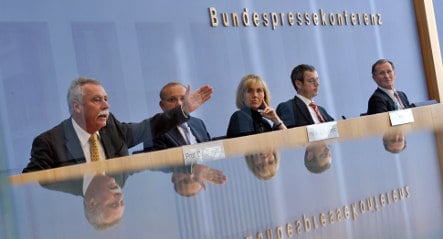The group of five economic advisors handed Chancellor Angela Merkel their annual report in which they predicted no economic growth next year and said the government’s announced measures would be of little help.
Gross domestic product (GDP) will grow 0.0 percent next year, after an expected gain of 1.7 percent this year, said the economists known as the Five Wise Men until a woman, Beatrice Weder di Mauro, joined in 2004.
Berlin recently cut its forecast for economic growth to a mere 0.2 percent in 2009 as the financial crisis continues to send shock waves around the world. The panel said that “the conditions are in place to talk about recession,” given the brutal nature of the slowdown.
The government will publish figures for third-quarter growth Thursday and if it contracted for the second three-month-period running, as widely expected, the world’s top exporter will already be officially in recession.
The economists dismissed a recent multi-billion-euro bundle of tax breaks and state investment as a “hotch-potch of isolated projects designed to give the impression that the government is doing something.” It said the package was far too small to have a real impact, and unfairly targeted at specific industries such as automaking thanks to heavy lobbying.
Merkel acknowledged her left-right government was grappling with a crisis that was difficult to manage or fully understand and said Berlin was doing its best to help the country weather the storm.
“We are in a situation now in which it is extremely difficult for all of us to know exactly what the future will bring,” she said as she accepted the report.
The experts noted that Germany’s “real economy” had as yet remained relatively unscathed but it forecast that unemployment would rise 1.1 percentage points next year.
Last week Merkel’s cabinet approved a raft of measures aimed at stimulating the economy with an extra €50 billion ($63 billion) in investment in 2009 and 2010, in what she called a “bridge” for the economy until activity picks up.
The stimulus measures were approved less than three weeks after Merkel’s government rushed through parliament a €480-billion rescue package to save the country’s banks from collapse.
Merkel has stressed the stimulus measures are “targeted,” after Berlin was highly critical of proposals by French President Nicolas Sarkozy – whose country holds the current EU presidency – for Europe-wide state intervention on a massive scale. But economists are sceptical that the measures will do the trick.
The daily Financial Times Deutschland said in an editorial Wednesday based on leaked copies of the report that it hoped Merkel and her cabinet would heed the panel’s advice.
“The experts’ report could be the last chance to move the coalition towards a re-think,” it said. “If the government doesn’t even listen to a committee of experts it appointed itself then that would really give cause for despair.”



 Please whitelist us to continue reading.
Please whitelist us to continue reading.